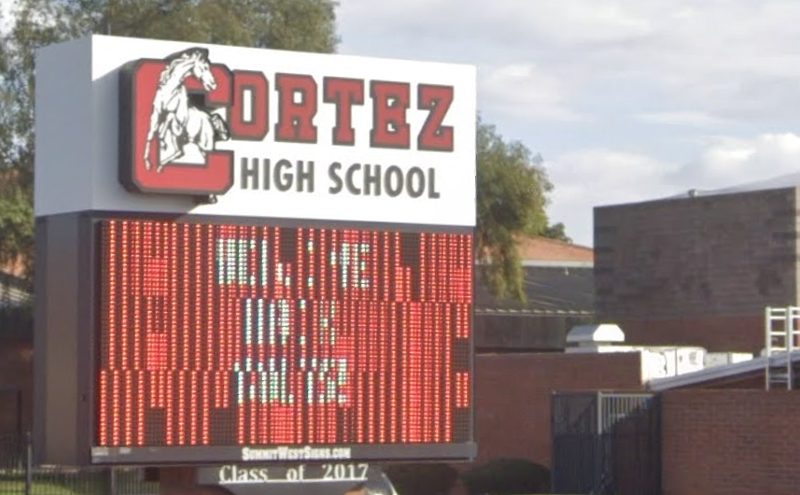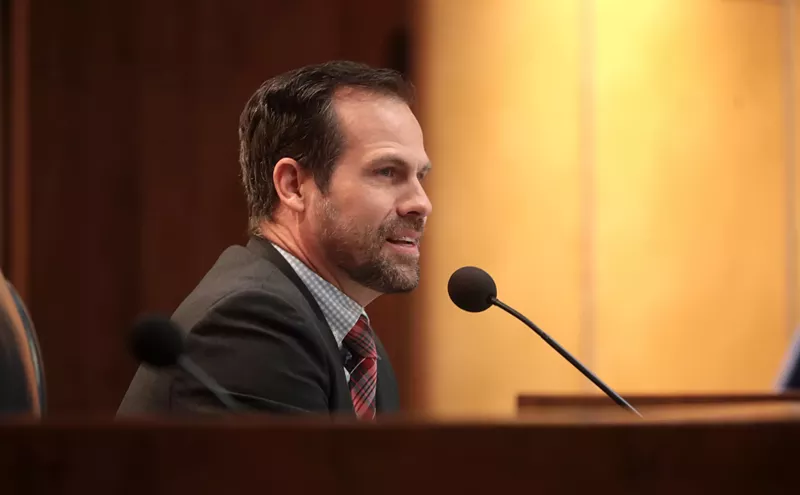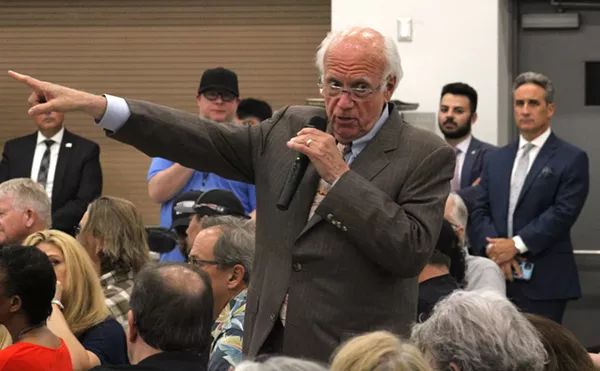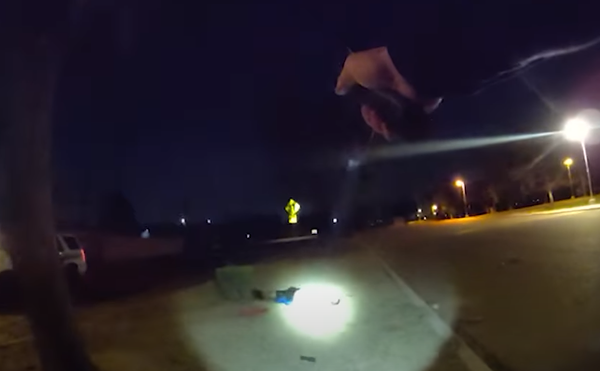During an hour-long status conference Monday in Sheriff Joe Arpaio's never-ending contempt case, federal Judge G. Murray Snow granted a request by the U.S. Department of Justice to review documents from Arpaio's confidential informant Dennis Montgomery in the MCSO's so-called "Seattle investigation."
That investigation, as first revealed in June of last year by Phoenix New Times, was an attempt by Arpaio and his Chief Deputy Jerry Sheridan to gin up a conspiracy theory involving Snow, the DOJ, former U.S. Attorney General Eric Holder and others, in an effort to conflict Snow off the ACLU's big civil rights case Melendres v. Arpaio.
The DOJ's bid to review the data has been pending since Snow ordered a stay in May, after Arpaio's lawyers sought to have Snow recuse himself from the case, a desperation move that was doomed to failure and essentially bought Arpaio's attorneys a delay of two months.
On July 10, Snow formally denied the recusal request and lifted the stay, setting Monday's hearing at the Sandra Day O'Connor U.S. Courthouse in Phoenix, where several issues were addressed by the court, including whether or not the DOJ would be allowed access to bankers boxes and computer files provided to the MCSO by Montgomery during a year-long investigation, which involved payments of more than $120,000 to Montgomery, an alleged computer guru then living in Seattle.
Both Sheridan and Arpaio agreed with Snow's characterization of the material as "junk" during their testimony before the judge in April.
Nevertheless, my sources say the MCSO may have spent close to $1 million on the probe, which involved buying $50,000 worth of computer equipment for Montgomery, as well as airplane flights to and from Seattle (plus expenses) for two MCSO deputies and Mike Zullo, commander of Arpaio's Cold Case Posse.
On Monday, DOJ attorney Rafael Gomez asked to make copies of the documents and data so that the DOJ and other U.S. government agencies could look through it in Washington, D.C. for any confidential or sensitive material.
Attorney Larry Klayman of the right-wing group Freedom Watch was present, representing Montgomery.
He asked the judge if he could address the court to object to the DOJ's having access to the material and to argue in favor of his request to appear before the court pro hac vice, a special status sought by attorneys from outside jurisdictions.
Snow let Klayman speak, but not to his pro hac vice application, noting that another attorney from Freedom Watch had sought to intervene in the case with Klayman's assistance and that Klayman likely would have the same conflicts as the other Freedom Watch counsel.
Klayman asked Snow not to release the documents so as to protect Montgomery's "property interests."
Snow wondered what property interests would be involved if Montgomery had taken the data from the CIA, which supposedly had harvested it from the American people, if the tale Montgomery purportedly told the MCSO turned out to be true.
Klayman pointed to a nine year-old case where the DOJ had to give back similar data to Montgomery, but Snow wondered how that related to information regarding his court and Melendres and how the property interests of the current files differed from the Montgomery's interests in the prior federal case.
"I don't have that information," Klayman told the court.
The judge also noted that Klayman may be a witness in the contempt case, given that he was involved in email communications with Zullo and MCSO detective Brian Mackiewicz, the lead detective in the Seattle operation.
Those emails were recently made public by the court and show that in 2014 Klayman took credit for getting another federal judge involved in the case, presumably to meet with Montgomery and review some of Montgomery's material.
In one email, Klayman mentions the name "Lamberth," possibly a reference to senior federal Judge Royce Lamberth, a former presiding judge of the Foreign Intelligence Surveillance Act court in Washington, D.C.
Lamberth has declined comment on any meetings with Montgomery.
After allowing Klayman to speak, Snow granted the DOJ's request to allow the U.S. government to review the material, as long as it did not disclose it to a third party.
Snow said that the court may take up Klayman's application for pro hac vice status at the next hearing, scheduled for July 31.
The judge also denied a stay request sought by Arpaio's lawyers in the case until they can ask the Ninth Circuit Court of Appeals to consider Snow's decision not to recuse himself.
In order not to overlap with a possible trial in United States v. Maricopa County scheduled for August 10 before federal Judge Roslyn O. Silver, Snow said he would keep the following dates open on his calendar for a resumption of the contempt proceedings: September 22-25, and September 29 through October 2.
Arpaio and Sheridan have admitted to civil contempt of Snow's orders. What remains is whether Snow refers the case for criminal prosecution.
After the hearing, on the elevator down from Snow's Sixth Floor courtroom, Arpaio complained of the illustration for my last column, which showed him in a line of prisoners headed to Tent City.
Why did we depict him in stripes and chains, he wondered?
"Because that's where criminals belong, Joe," I snarked.
The elevator opened and he stomped off with his security detail, heading for a basement garage, where he didn't have to do battle with the phalanx of press awaiting him outside the courthouse.
There, in the muggy, midday heat, Klayman told reporters that this case was fraught with conflicts of interest. He offered that, for instance, the ACLU was now being sued by Montgomery over the ACLU's characterization of Montgomery's material, and so ACLU attorney Cecillia Wang should remove herself from the case.
As for himself and Freedom Watch, he said, they have no such conflicts, despite currently representing Arpaio in a challenge of President Obama's executive orders on immigration.
I asked Klayman about the e-mails between himself and Mackiewicz, didn't these show a conflict of interest on his part?
Klayman clammed up and walked away, refusing to answer the question.
The DOJ also moved today to intervene in Melendres.
This might be a good thing for the ACLU, as far as having more warm bodies around to help with all the work there is to be done.
But considering the DOJ's recent concessions to Arpaio as part of a settlement in U.S. v. Maricopa County, here's hoping that if they're allowed to "intervene," they have zero decision-making ability in how the plaintiffs go forward.
Email [email protected].
On Twitter @stephenlemons.
Valley Fever on Twitter: @ValleyFeverPHX.

Audio By Carbonatix
[
{
"name": "GPT - Billboard - Slot Inline - Content - Labeled - No Desktop",
"component": "21251496",
"insertPoint": "2",
"requiredCountToDisplay": "2"
},{
"name": "STN Player - Float - Mobile Only ",
"component": "21327862",
"insertPoint": "2",
"requiredCountToDisplay": "2"
},{
"name": "Editor Picks",
"component": "16759093",
"insertPoint": "4",
"requiredCountToDisplay": "1"
},{
"name": "Inline Links",
"component": "17980324",
"insertPoint": "8th",
"startingPoint": 8,
"requiredCountToDisplay": "7",
"maxInsertions": 25
},{
"name": "GPT - 2x Rectangles Desktop, Tower on Mobile - Labeled",
"component": "21934225",
"insertPoint": "8th",
"startingPoint": 8,
"requiredCountToDisplay": "7",
"maxInsertions": 25
},{
"name": "Inline Links",
"component": "17980324",
"insertPoint": "8th",
"startingPoint": 12,
"requiredCountToDisplay": "11",
"maxInsertions": 25
},{
"name": "GPT - Leaderboard to Tower - Slot Auto-select - Labeled",
"component": "17012245",
"insertPoint": "8th",
"startingPoint": 12,
"requiredCountToDisplay": "11",
"maxInsertions": 25
}
]











